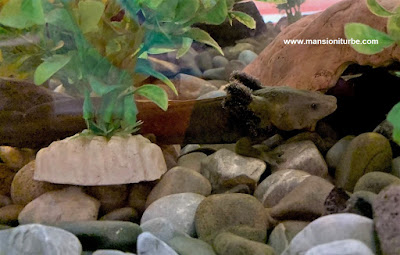Achoque, the Salamander of Lake Pátzcuaro
The achoque of Pátzcuaro is facing an extremely high risk of extinction. This salamander
is a sample of the wealth of species we have and must be protected. It is
an endemic species of Lake of Pátzcuaro.
 |
| Achoche, The Salamander of Lake Patzcuaro |
The Dominican nuns of Pátzcuaro have worked hard to save the achoque with the support of specialists from the Universidad Michoacana de San Nicolás de Hidalgo, as well as the Zoo of Chester in England. Both national and international media have turned their eyes toward Pátzcuaro and the outstanding work of the Dominican nuns.
This summer, at the Museum of Natural
History in Morelia, we visited the exhibition "The Wonderful World of
the Achoque.” It was an excellent show, with the collaboration of the Universidad
Michoacana, the Coordinación de Investigación Científica, la Facultad de
Biología, el Laboratorio de Biología Acuática of UMSNH, Chester Zoo Act for
Wildlife, the Mohamed bin Zayed Species Conservation Fund and Zacango Parque
Ecológico.
 |
| Achoque Exhibition in Morelia at the Museum of Natural History |
“What are achoques?” It is the question asked by our guests at Hotel Mansion Iturbe when they buy the famous jarabe (syrup) de achoque that the Dominican nuns in Pátzcuaro prepare and sell in their convent located at the back of the Basilica of Our Lady of Health in Pátzcuaro.
The achoque is an amphibian and belongs to a group of salamanders known
as Ambystoma Dumerilli, which goes back more than 370 million
years.
“Achoque” comes from achoki and ach-o (meaning
“mud,” because it lives at the bottom Lake Pátzcuaro where there is mud)
and ats(tadpole).
 |
| Achoque, Salamander Ambystoma Dumerilli |
The achoque has become part of the idiosyncrasy of the indigenous (Purépecha)
people; it is said that in ancient times it was used in a dish that could only
be consumed by the nobles.
In Mexico there are eighteen species of salamanders ambystomas, and
there are five in Michoacán, but ambystoma dumerilli is unique
to Lake of Pátzcuaro.
The achoque is a cousin of the axolotl, which can be found in Xochimilco. An
important difference between these two types of salamander is their color, the
axolotl is pink and the achoque has a greenish-yellow color.
The achoque has the ability to regenerate some parts of your body, this
related to Neoteny, referring this to remain in larva form, even if they are
already adults, thus preserving larva characteristics throughout his life.
 |
| Achoque, the Salamander of Lake Patzcuaro |
Currently in Pátzcuaro, the
Secretary of agriculture and Social Development SADER, looking for the
preservation of the Achoque of Patzcuaro, is carrying out a
comprehensive project through CRIAP Pátzcuaro (aquaculture laboratory), which
includes the production intensive of these Achoques, seeking knowledge about
this salamander and thereby generate proposals for conservation through
sustainable management.
On your next visit to Pátzcuaro,
you can also take actions to protect our habitat. Join the conservation effort
headed by the municipality of Pátzcuaro. Don’t litter and generate as
little waste as possible. In this manner, you support the preservation of the
ecosystem of Lake of Pátzcuaro.
*Text and pictures property of Hotel Mansión Iturbe.
We invite you to check more post in our blog, you will find information about Pátzcuaro and the surrounding area, that we hope will be useful for your next trip to our colonial town in Mexico!
Here are some post that we suggest you:
Hotel Mansion Iturbe
Portal Morelos 59









Comentarios